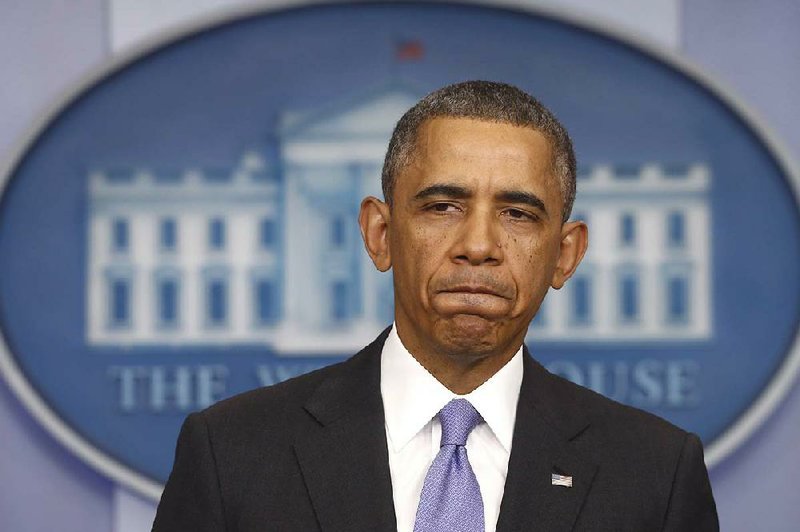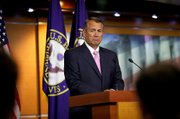WASHINGTON - President Barack Obama reversed course Thursday and said millions of Americans should be allowed to renew individual coverage plans now ticketed for cancellation under the health-care law.
RELATED ARTICLE
http://www.arkansas…">State to stick with plan for individual policies
“I completely get how upsetting this can be for a lot of Americans, particularly after assurances they heard from me that if they had a plan that they liked they could keep it,” said Obama, who repeatedly took responsibility for the health-care roll out, which has put Democrats on the defensive. “And to those Americans, I hear you loud and clear. I said that I would do everything we can to fix this problem. And today I’m offering an idea that will help do it.”
The president’s plan would apply only to people who have had their existing policies canceled. Those currently without insurance would not be able to buy the old plans.
The immediate impact on consumers was unclear, though industry spokesmen and state insurance commissioners swiftly warned that higher prices could result from the president’s rapid turnaround.
Karen Ignagni, president and chief executive officer of America’s Health Insurance Plans, an industry trade group, warned that Obama’s action “could destabilize the market and result in higher premiums for consumers” and hinted the industry would seek unspecified assistance.
“If now fewer younger and healthier people choose to purchase coverage in the exchange, premiums will increase and there will be fewer choices for consumers,” Ignagni said in an emailed statement. “Additional steps must be taken to stabilize the marketplace and mitigate the adverse impact on consumers.”
The change “puts the insurance companies, who have successfully complied with the law, in a hell of a mess,” said Robert Laszewski, an Alexandria, Va.-based consultant to the industry.
Under pressure from consumers as well as congressional Democrats, Obama said at a news conference that the administration no longer would require insurance companies to jettison current individual and small group plans that fall short of the minimum coverage standards under the law, effectively shifting responsibility for cancellations to the industry itself. The change would be good for just one year, though senior administration officials said it could be extended if problems persist.
Speaking of the millions of people whose coverage is being scrapped, Obama said, “What we want to do is to be able to say to these folks, you know what, the Affordable Care Act is not going to be the reason why insurers have to cancel your plan.”
Officials disclosed Wednesday that fewer than 27,000 enrollments were completed in 36 states in the first month of operations for healthcare.gov.
In the nearly hour-long news conference, Obama repeatedly acknowledged that the start of the health-care program had been botched.
“I am very frustrated,” Obama said in one of his most self-reflective moments since he moved into the Oval Office. “But I’m also somebody who, if I fumble the ball, I’m going to wait for the next play and then run as hard as I can to do right by the team.”
Including enrollment of more than 79,000 in the 14 states with their own websites, the nationwide number was 106,000 for October sign-ups. But that is still far fewer than expected and a mere fraction of the cancellation notices that have gone out because of the law - more than 4 million according to an Associated Press survey.
In the debate over the law, Obama had promised that Americans who liked their existing insurance plans would be able to keep them.
“My expectation was that for 98 percent of the American people either it genuinely wouldn’t change at all or they’d be pleasantly surprised with the options in the marketplace” and the grandfather clause would cover the rest, he said, and that turned out not to be the case.
Obama’s approval ratings in polls also are ebbing, and he readily conceded that after recent events, the public can legitimately “expect me to have to win back some credibility on this health-care law in particular and on a whole range of these issues in general.”
Louisiana Insurance Commissioner Jim Donelon, president of the National Associated of Insurance Commissioners, said Obama’s proposal could lead to higher premiums and market disruptions next year and beyond.
“In addition, it is unclear how, as a practical matter, the changes proposed today by the president can be put into effect. In many states, cancellation notices have already gone out to policyholders and rates and plans have already been approved for 2014,” he added.
Nor was it clear how different states would react to the administration request to change the rules.
In California, where more than 900,000 cancellations have been sent out, Insurance Commissioner Dave Jones called on insurers to extend the policies being scrapped.
But in Washington state, his counterpart, Mike Kreidler, said he won’t allow that to happen. “I have serious concerns about how President Obama’s proposal would be implemented and more significantly, its potential impact on the overall stability of our health insurance market,” he said in a statement.
Until the president made his announcement, the administration had been assuming that individuals currently covered by plans marked for cancellation would switch to alternatives offered in government-established exchanges. If so, they would be joining millions of others who have lacked insurance in the past.
The people with current individual coverage are a known risk to insurers. But those without generally have had less access to medical services, and are more costly to care for. The theory has been that moving people with current coverage into the new markets would help stabilize premiums.
Only last week, Health and Human Services Secretary Kathleen Sebelius told a Senate panel she doubted that retroactively permitting insurers to sell canceled policies after all “can work very well since companies are now in the market with an array of new plans. Many have actually added consumer protections in the last 3½ years.”
It will now be up to individual companies to decide which plans remain for sale, subject to the approval of state insurance commissioners.
Insurers have opposed legislation that would allow or require them to continue individual insurance policies that have been canceled because they do not meet the requirements of the Patient Protection and Affordable Care Act.
Insurers fear that healthier policyholders would be more likely to take this option, leaving the new insurance exchanges with less-healthy people who are more expensive to insure.
Under Obama’s new policy, insurance companies will be required to inform consumers who want to keep canceled plans about the protections that are not included under those plans. Customers also will be notified that new options are available offering more coverage and in some cases, tax credits to cover higher premiums.
Whatever the effect on consumers, Obama’s announcement did nothing to quell Republican opposition to the overhaul they opposed, sought to have overturned at the Supreme Court and have voted numerous times to repeal.
House Speaker John Boehner, R-Ohio, said it was time to scrap the law “once and for all.” He said, “You can’t fix this government-run health-care plan called Obamacare. It’s just not fixable.”
Today, the Republican-controlled House is set to vote on a bill by Rep. Fred Upton, R-Mich., chairman of the Energy and Commerce Committee, that would allow Americans to keep their existing health coverage through 2014 without penalties - as well as allow new people to continue to buy the plans. White House officials said that would effectively gut the Affordable Care Act, and they said late Thursday that the president would veto the measure.
Approval in the GOP-controlled House is expected. Yet Obama’s statement, coupled with an as-yet-undisclosed Democratic alternative, could well hold Democratic votes for the measure to a minimum.
Looking forward, Democrats said the health-care law will still turn out to be a political winner.
“Voters, particularly inswing districts, would prefer a Democrat who promises to fix and improve the Affordable Care act to a Republican who is obsessed with repealing and gutting it,” said Rep. Steve Israel of New York, who heads the party’s campaign committee.
The president faced a different set of concerns in the Senate, where several incumbents seeking new terms in swing states have been seeking a vote on legislation to require insurers to offer renewals to existing individual plans for 2014 and indefinitely into the future.
The bill’s principal author, Sen. Mary Landrieu of Louisiana, said Obama’s announcement was “a great first step,” yet she added, “We will probably need legislation to make it stick.”
Said Senate Majority leader Harry Reid, “If we need to do more, we will.”
But others were not so eager to put the issue on the floor of the Senate.
Sen. Dick Durbin of Illinois, a member of the leadership, said there was “no need for a legislative fix.” Instead, he said Congress and the administration should continue improving the implementation, and “redouble our efforts highlighting and explaining what this historic law will mean for 40 million Americans without insurance.”
Obama also said he couldn’t guarantee that the website technical difficulties would be completely resolved by the end of the month.
“It will be a lot better but there will still be some problems,” he said.
In Cleveland on Thursday, Obama sought to put the spotlight on his economic and energy agenda, touting increased automobile fuel efficiency for helping reduce reliance on foreign oil.
For the first time in nearly two decades, the U.S. produced more oil at home in October than it imported. Obama called the shift “a huge competitive advantage” for the United States.
The president spoke at a Cleveland plant that makes steel used in cars that are now more fuel-efficient. Obama says the comeback of the auto industry during his presidency helped the ArcelorMittal plant and saved more than 1 million American jobs.
“We’ve got to do more to get those engines of the economy churning even faster,” Obama said. “But because we’ve been willing to do some hard things, not just kick the can down the road, factories are reopening their doors, businesses are hiring new workers.”
The president was highlighting some of the positive notes in the still sluggish economic recovery even as problems with the health-care law were the focus Thursday in Washington.
Information for this article was contributed by David Espo, Julie Pace, Jim Kuhnhenn, Ricardo Alonso-Zaldivar, Donna Cassata, Alan Fram and Laurie Kellman of The Associated Press; by Ashley Parker, Michael D. Shear and Robert Pear of The New York Times; and by Roger Runningen, Alex Wayne, Mike Dorning, Roxana Tiron, Michael C. Bender, Margaret Talev and Lisa Lerer of Bloomberg News.
Front Section, Pages 1 on 11/15/2013


